On November 7 and 8, the International Forum of "Universalization of Higher Education and Cultivation of Talent in Universities" and the 2020 Annual Academic Conference of Institutional Research Branch of China Association of Higher Education were held at Xi'an Eurasia University.
The forum was co-organized by the Institutional Research Branch of China Association of Higher Education and Xi'an Eurasia University. More than 400 people from 132 universities and research institutes in 26 provinces attended the conference. In addition, more than 11,000 viewers from Canada, the United States, Hong Kong and Macao watched the conference via live streaming.
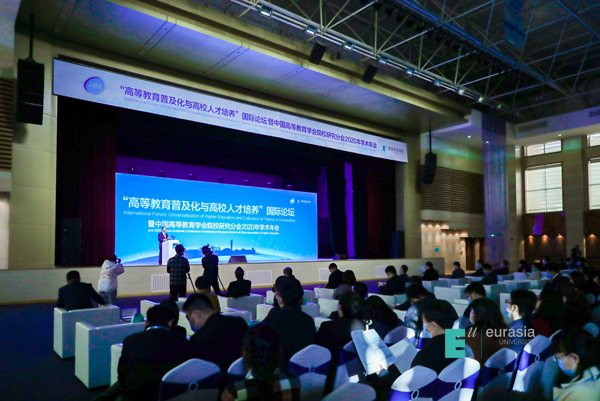
Scene of the opening ceremony
On the morning of November 7, Zhang Junchao, General-Secretary of the Institutional Research Branch of China Association of Higher Education and Deputy Dean of School of Education at Huazhong University of Science and Technology, hosted the opening ceremony of the forum. The main forum was divided into two sessions, which were respectively moderated by Prof. Chen Ning, Vice President of the Institutional Research Branch of China Association of Higher Education and former President of Chengdu Normal University, as well as Prof. Piao Xuetao, Cheif SupervisorChairman of the institutional Research Branch of the China Association of Higher Education and Dean of the Educational Scientific College at Shenyang Normal University.
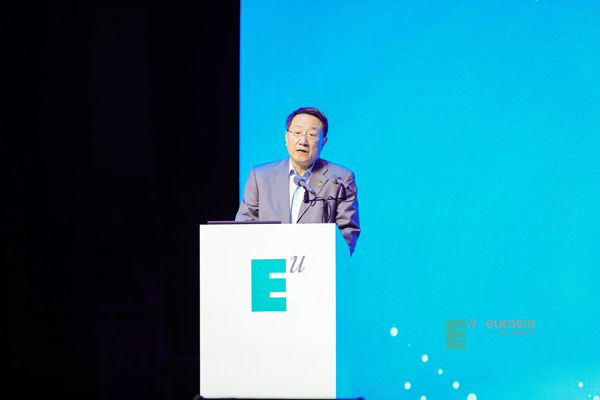
Prof. Zhang Wei delivers a speech
In his speech, Prof. Zhang Wei, Vice President of the China Association of Higher Education and Secretary of the Party Committee of Northwestern Polytechnical University, welcomed the guests and encouraged the Institutional Research Branch to continue to play an active role in boosting China's higher education power.
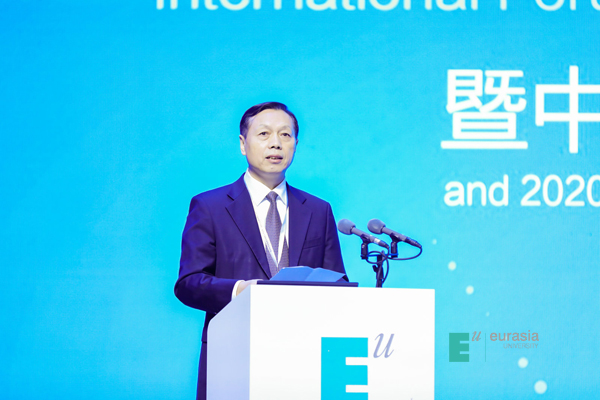
Prof. Zhang Anfu delivers a speech
In his speech, Prof. Zhang Anfu, president of the Institutional Research Branch of China Association of Higher Education, pointed out that the forum focused on the new situation facing the universalization of higher education in China, which will promote institutional research to better serve the reform and development of universities.
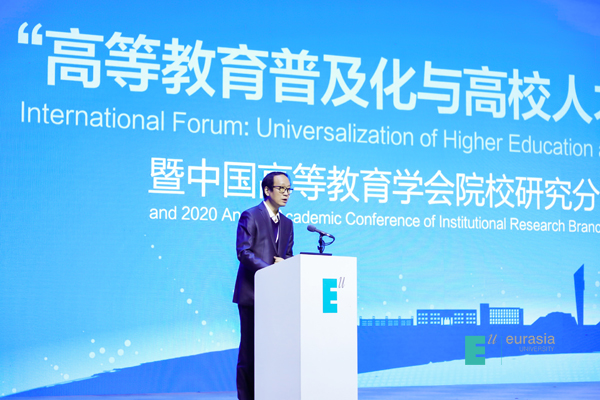
Zhu Zhengnan, First-level Inspector of the Education Department of Shaanxi, delivers a speech
In his speech, Zhu Zhengnan, First-level inspector of Education Work Committee of Shaanxi Provincial Party Committee and Education Department of Shaanxi, congratulated on the successful opening of the forum and looked forward to discussing the inner laws and development trend of higher education with the experts to accelerate the high-quality development of higher education in Shaanxi.
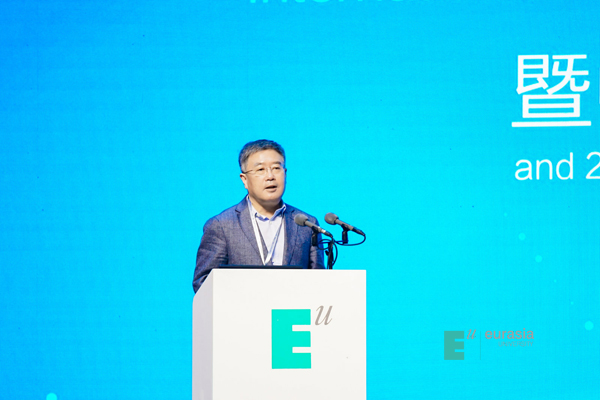
Prof. Guo Lihong delivers a speech
Prof. Guo Lihong, President of the Shaanxi Association of Higher Education, President and Vice Secretary of the Party Committee of Northwest University, congratulated on the opening of the forum and hoped that all the cooperative universities and institutions would deepen their cooperation and make greater contributions to the development of China's higher education.
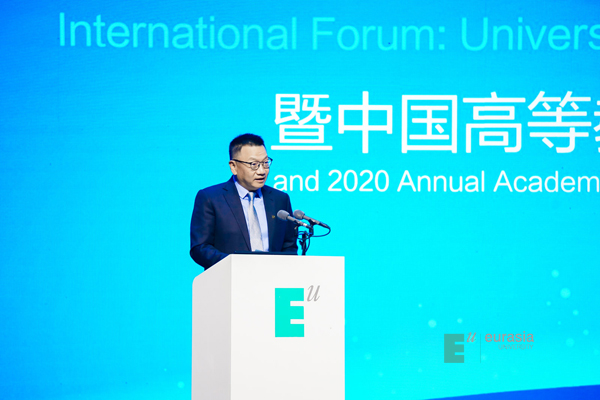
Prof. Hu Jianbo delivers a speech
In his speech, Prof. Hu Jianbo, Founder and Chairman of Xi'an Eurasia University thanked the guests for their presence and expressed the university will work with the experts as an experimental base to study and explore the new quality connotation and practice path of higher education in the context of universalization, and to contribute to the modernization of higher education in China.
In the report stage of the main forum, nine top scholars at home and abroad gave keynote speeches on "Universalization of Higher Education and Cultivation of Talent in Universities".

Prof. Liu Xianjun gives a report
Prof. Liu Xianjun, the founding chairman and honorary president of the Institutional Research Branch of China Association of Higher Education, made a report entitled "Promoting the Maturity of China's Institutional Research". He made an in-depth analysis of the conditions, signs and priorities for the maturity of China's institutional research, and pointed out that more demands and more problems will be faced by institutions as they move towards maturity, which will require more efforts.
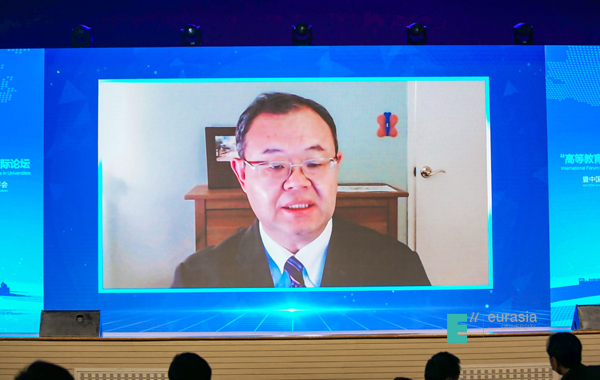
Prof. Chang Tongshan gives a report
Prof. Chang Tongshan, Director of Institutional Research and Academic Planning at the University of California (UC) Office of the President, in his presentation on "Diversity and Cooperation Mechanisms in Universalization of Higher Education," used the practical experiences of the UC, California State University, and California Community Colleges as examples to illustrate the importance of diversity, differentiation and cooperation mechanisms in the universalization of higher education.
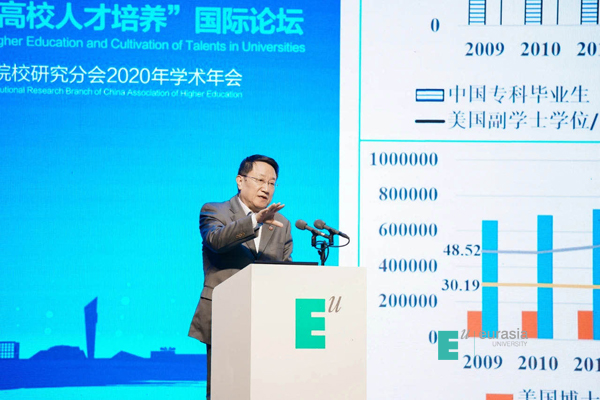
Prof. Zhang Wei gives a report
Professor Zhang Wei, Vice President of China Association of Higher Education and Secretary of the Party Committee of Northwestern Polytechnical University, made a presentation titled "The Hierarchy and Structure of Higher Education". By comparing the scale and structure of the junior college program, and degree programs of bachelor's degree, master's degree and doctoral degree in China and the United States, he pointed out that the structure, level and regional distribution of the Chinese higher education need to be further optimized after China enters the stage of universalization of higher education.
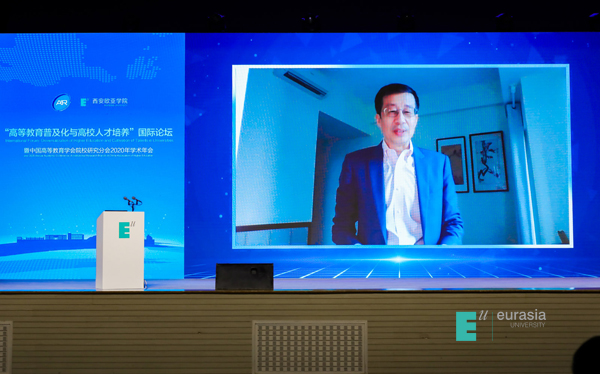
Prof. David X. Cheng gives a report
Prof. David X. Cheng, President for Global Services at the City University of Hong Kong, in his report "International Student Recruitment Management: A Research Area in Need of Development", explained how to conduct international recruitment and international student management in the light of the post-epidemic external environment of higher education and international experience, and suggested that Chinese universities must seize the opportunity to raise the standard of internationalization.
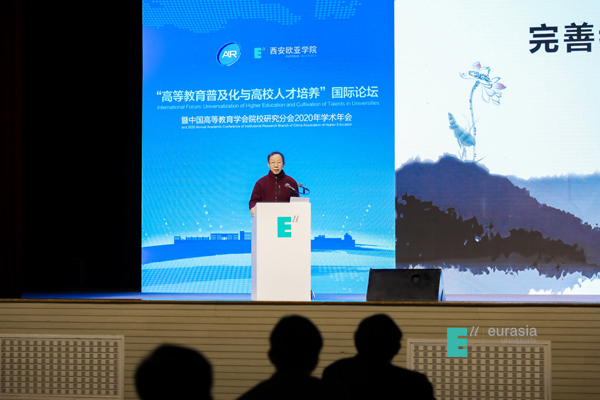
Prof. Mou Yanlin gives a report
Prof. Mou Yanlin, Vice President of the Institutional Research Branch of China Association of Higher Education and Member of Science & Technology Commission of the Ministry of Education, made a presentation entitled "Jurisprudential Considerations on Improving the Right to Teacher Training in China", discussing the source, composition, and dilemma of the right to teacher training, and made suggestions for amending the Teacher Law to protect the right to teacher training.

Prof. Zhao Juming gives a report
Prof. Zhao Juming, Deputy Director of the Research Center for Institutional Development at Huazhong University of Science and Technology, in his report "The Unbalanced Balance: An Investigation into the System of 'Valuing Research over Teaching' in Teacher Evaluation Policies", studied the problem of 'valuing research over teaching' in university teacher evaluation using institutional analysis, and explained the institutional reasons for the imbalance between teaching and research. He suggested that universities get more authority to operate according to their own needs and conditions and design their own teacher evaluation systems to meet those needs.

Prof. Shi Jinghuan gives a report
Professor Shi Jinghuan, director of the Academic Committee of the Institute of Education, Tsinghua University, pointed out in her report Research on Chinese College Students' Learning Problems in Universalization of Higher Education that education should focus on "learning" to shape an integrated evaluation and improvement model driven by quality, so that college students can achieve better outcomes and adapt to the changing world.
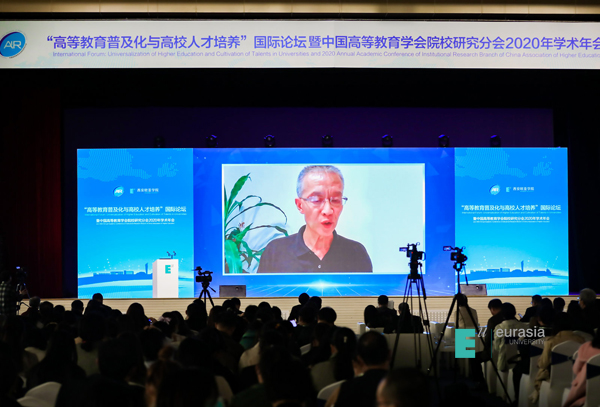
Report by Professor Sun Jianrong
Professor Sun Jianrong, assistant vice-president of Macau University of Science and Technology, delivered a report entitled Quality Assurance of Talent Cultivation in Universalization of Higher Education: Thoughts on the Implementation of the US Educational Accreditation in China. Referring to the concept of educational accreditation in the US, he put forward several suggestions on the quality assurance of talent cultivation in the universalization of higher education in China, and pointed out that focus should be placed on students' learning effectiveness to constantly improve the quality of other aspects of teaching.
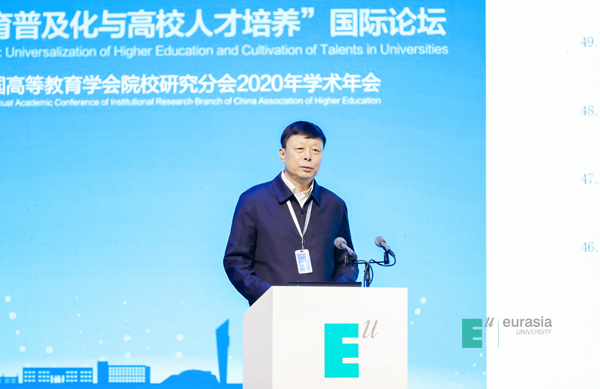
Report by Professor Xin Baozhong
Professor Xin Baozhong, vice chairman of the Institutional Research Branch of China Association of Higher Education and secretary of the Party Committee of Harbin Normal University, delivered a theme report entitled Dual Challenges Facing the Development of Higher Vocational Colleges in China during Universalization and Countermeasures, pointing out that the restructuring of higher vocational education should adapt to the characteristics of students and teaching content as well as the objectives of cultivation.

Scenes of the first, second and third sub-forums from top to bottom
Three sub-forums were held at the same time on the afternoon of November 7: Leadership Decision-making and Institutional Development Strategies in Universities in the New Era, Teaching Reform, Curriculum Construction and Student Learning in Universities and Theory and Method of Institutional Research. Twenty-four scholars and researchers shared their latest research achievements and experiences on the characteristic development of universities, the 14th Five-Year Plan, the leadership model of universities, curriculum design, teacher performance and evaluation, students' learning motivation, teaching management and reform, as well as theoretical methods and organizations of institutional research, and exchanged their views on hot issues related to the topic of the conference.
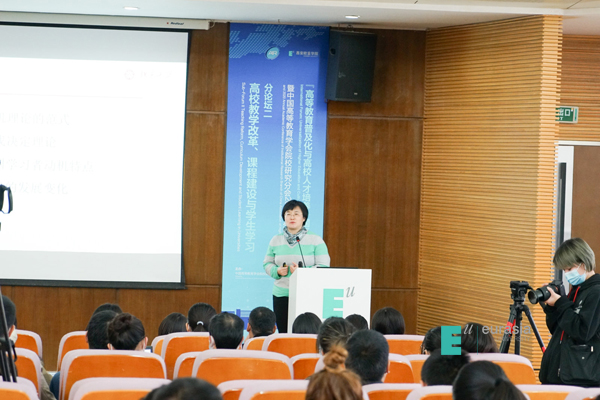
Campus tour of Xi'an Eurasia University
On the morning of November 8, a special seminar on institutional research cases was held at Xi'an Eurasia University. Representatives present at the seminar visited the student living room in the south district of Eurasia, the newly renovated teaching building of the School of Humanity Education, the teaching building of engineering, the exhibition hall of educational reform concept, the design museum and other teaching places and campus spaces.
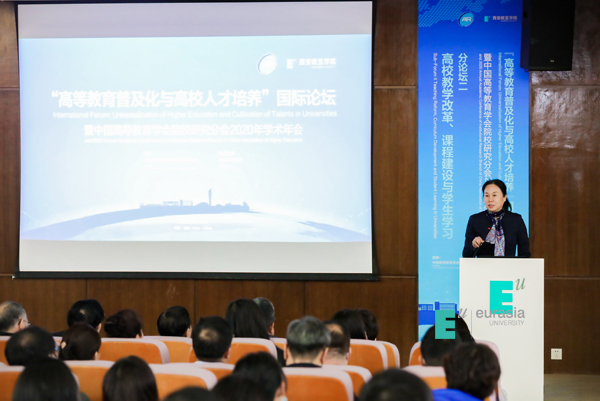
Seminar on Institutional Research Cases of Xi'an Eurasia University
Subsequently, Professor Liu Jin, president of Xi'an Eurasia University, presided over the report meeting of institutional research cases. Vice President Li Zheng and Assistant Presidents Zhang Lefang and Wang Xiaohua delivered speeches on the evolution of and reflection on Eurasia's strategic planning, the reform of "student-centered" talent cultivation program and the reconstruction of curriculum system, and the characteristic higher vocational education model of Eurasia, sharing the educational philosophy, characteristics of talent cultivation model and management experience of Xi'an Eurasia University.
In his report, Professor Hu Jianbo, chairman of Xi'an Eurasia University, shared the quality concept and values of Eurasia, set forth assumptions for the external environment, special mission and core competitiveness for the high-quality development of Xi'an Eurasia University in the future, and put forward that private university operators should be driven by passion, uphold clear and strong values, and pursue high-quality development unswervingly. Experts present at the meeting carried out discussions on related issues, highly recognized Xi'an Eurasia University's active exploration and remarkable achievements in higher education, and offered insights into the development in the next stage.
Professor Lu Caichen, executive vice dean of the Institute of Higher Education, Lanzhou University, Associate Professor Li Linlin from the Institute of Higher Education, East China Normal University, and Professor Lei Hongde, director of the Institute of Institutional Research, School of Education, Huazhong University of Science and Technology, were entrusted by the sub-forum conveners to summarize the three sub-forums at the closing ceremony. Professor Zhang Anfu, chairman of the China Association of Higher Education, made an overall summary of the conference. In his speech, he expressed heartfelt gratitude to the leaders of Xi'an Eurasia University and the staff and student volunteers of the Conference Affairs Team for their hard work and high-quality service. He pointed out that this academic conference is a unique, high-end and practical one that conforms to times, and urged all participants to join their hands, adhere to the four principles of "usefulness, effectiveness, openness and innovation", and work together for the prosperity of institutional research.
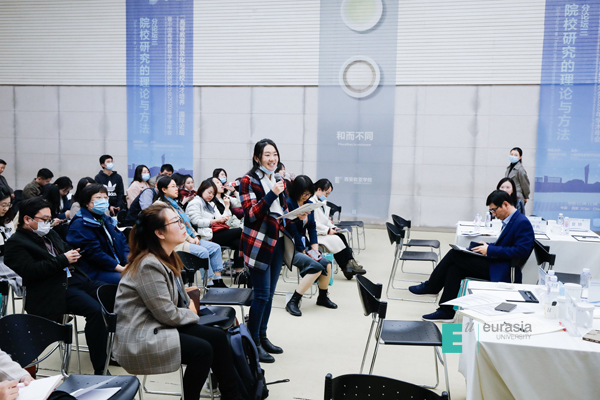
The international forum brought together first-rate scholars and experts in higher education research inside and outside China, and introduced the most cutting-edge institutional research achievements and experiences at home and abroad in the universalization of higher education and talent cultivation in universities, playing a positive role in promoting the vigorous development of institutional research and the high-quality development of colleges and universities against the backdrop of the universalization of higher education.
"While other universities build parks in their campuses, Eurasia build its campus in the park," said a student's mother commenting on Eurasia's campus. Even if you sit in the classroom, you can hear birds singing outside the window.
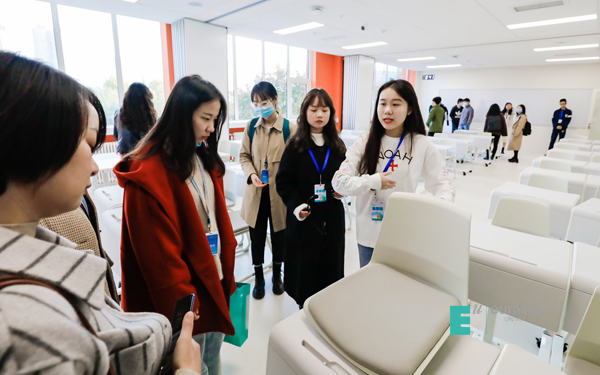
The two-decade meticulous construction makes Eurasia one of the most beautiful universities in Shaanxi. Its experience in green campus construction provides a reference for Xi'an's green city construction. Eurasia also received support from the International Finance Corporation (IFC) for the further development of the green campus in 2016.






